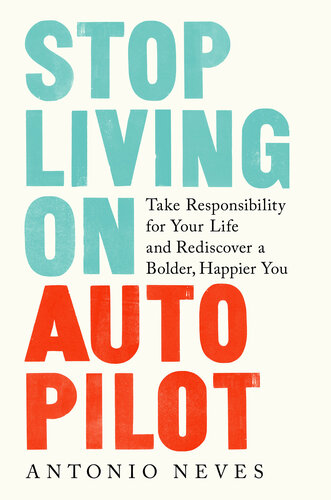Antonio Neves, an award-winning journalist, renowned speaker, author, and leading success coach has said “you’re just one decision away from a better life, better career, better relationships, better health, better wealth—a better anything.” This certainly holds true as many of you have probably found yourselves stuck or at standstill at some point in your journey with a decision to make.
Today on The Atlanta Small Business Show, we’re diving into the principles mentioned in Neves’s latest book titled Stop Living On Autopilot: Take Responsibility for Your Life and Rediscover a Bolder, Happier You. Neves has also been featured on the TODAY Show, Forbes, PBS, and Inc.com, to name a few.
Jim Fitzpatrick:
Hi everyone. I’m Jim Fitzpatrick. Thanks so much for joining us on today’s show. Antonio Neves, an award-winning journalist, world renowned speaker, author, and top success coach has said you’re just one decision away from a better life, a better career, better relationships, better health, better wealth, and better anything. And this certainly holds true for many of you out there right now, owners of businesses and sales professionals, and such.
Jim Fitzpatrick:
Probably found yourselves a standstill, I should say, at some point in your journey with the decision to make. Antonio’s latest book is titled Stop Living on Autopilot: Take Responsibility for Your Life and Rediscover a Bolder, Happier You. So on today’s show, we are diving into those principles mentioned in the book, and we’ll also learn about his own journey through his entrepreneurship. So Antonio, thank you so much for joining us on the show. We very much appreciate it.
Antonio Neves:
Jim, it’s great to be here. Thank you.
Jim Fitzpatrick:
Sure. So you’ve worked as a correspondent in New York city and with top television networks, including NBC, PBS and BET networks for over 10 years. Take us back and tell us a little bit more about your background and what led you to make the switch to speaking and writing and crisscrossing the country, if not the world sharing your message.
Antonio Neves:
Sure. I was fortunate to have a 10 plus career in the television industry in New York city. And my last three years, I worked with NBC, and I had the pleasure and fortune of traveling all across the country, and interviewing and profiling top CEOs, executives, entrepreneurs, you name it. And when I talked to these amazing women and men, first and foremost, one thing I found that they all had in common was that their organizations had amazing cultures like leadership and development, continued growth and learning was just baked into everything that they do.
Antonio Neves:
But something else that I saw that was really interesting was that all of these, again, stellar men and women who you’ve seen on the cover of magazines, all worked with coaches. And I really started nerding out on the leadership and development space and coaching. And I realized, I’m sure as you can relate to as a journalist, at the end of the day we’re professional storytellers, we’re professional question askers. And those are skillset that I get to use every single day as an author, as a coach and speaker. And I can’t tell you, it is so rewarding to support people as they’re navigating challenging circumstances, decisions they have to make or beyond.
Jim Fitzpatrick:
Well, I can imagine. And that must have been a heck of a career that you’ve had and an experience out there to draw upon now. But so what do you think is the number one mistake that people make when they reach a breaking point in their lives or their career?
Antonio Neves:
Yeah, one of the biggest mistakes we can do is we can isolate ourselves from other people. No one who has accomplished anything of significance did it alone. But research shows one out of five Americans when they’re going through a challenging time or tough time, they have no one to talk to. Loneliness, even prior to the pandemic, there was an epidemic of loneliness. So one of the biggest pieces of advice I give to people is, don’t do it alone. Seek out support, guidance, coaching, you name it.
Jim Fitzpatrick:
Yeah. So in your book, Stop Living on Autopilot, which is great title. I love that, the name of that book, you outline your own journey through living on autopilot. What does it look like to live on autopilot?
Antonio Neves:
Oh, living on autopilot can… When you transition from doing great work to good enough work, when you’re living on autopilot, you are no longer learning like you once used to. You are no longer building strong relationships. You have settled for the status quo. It is like driving an amazing Lamborghini that these bodies that we have are, but only driving at 35 miles per hour.
Jim Fitzpatrick:
Right.
Antonio Neves:
So it’s when you’ve stopped being bold and you stop being courageous in your pursuits and you settled. And as you mentioned, I witnessed that firsthand in my life as well.
Jim Fitzpatrick:
Yeah, I bet. And you’re exactly right about that. We all hit that point where we just go, “Okay, enough,” and this is why we’re not going to push any further. When in reality, the greatness can really, really happen just a little bit further down the road, can’t it?
Antonio Neves:
Absolutely. We have to be pushed, right? I call it finding the edge in our book. And I just like to invite people if they ever were an athlete before in their life. And to think about those moments before the gun would go off before a race or before a whistle would go off before a game, how you got that increased heart rate and butterflies in your life. And just to ask yourself, have you felt that in the last 30 days? Are you getting that on a regular basis, where you are stretching yourself, where you are growing yourself, where you are moving forward and most people they’re not feeling that on a regular basis.
Jim Fitzpatrick:
Yeah, boy, that’s so true. What are some of the easy steps that we can take to stop living on autopilot?
Antonio Neves:
Yeah. First and foremost, again, don’t do it alone. Surround yourself with a group of people that I call allies of glory. These are individuals that encourage you, inspire you, challenge you, and most importantly, push you and hold you accountable to be the absolute best version of yourself. So don’t do it alone. I’m going to invite people, I’m going to challenge people to start learning again. It’s like after we finish our formalized education, whether that’s high school or university, it’s as if we think our education comes to an end, but it doesn’t.
Jim Fitzpatrick:
Right.
Antonio Neves:
We can learn for free in the confines of our automobile, listening to a podcast or an audio book.
Jim Fitzpatrick:
That’s right.
Antonio Neves:
As you would know, they’re amazing Ted talks and videos on YouTube and beyond.
Jim Fitzpatrick:
That’s right.
Antonio Neves:
So we have to continue learning. Surround yourself with amazing people and do not stop learning.
Jim Fitzpatrick:
Yeah. That is so true. So many of us do just that, don’t we? Even later on in life, you just start to wind down because mentally somebody told you that it’s time to wind down. It’s been going on for well over 100 years where it’s like, “Oh, no, you’re going to retire at 60 or 65.” So when you even hit 50, you start thinking about that, and you start thinking about, instead of gearing up to have your best 20 or 30 years ahead of ,you find people that really mentally start to wind down. And I’ve even been in that situation myself. And then before I snap out of it, when somebody says, “What are you doing? You’ve got a lot of runway left.” It’s almost like you’re preparing to die just after retirement. And you see so many people where that’s the case. They really start to slow down and sometimes their best years are just ahead, right?
Antonio Neves:
I agree, 100%. I always like to say a tombstone can have three dates. The date we’re born, the date we give up, and the date that we die. And sadly, for a lot of people, there’s a big gap between the date that we give up, and the day that we die.
Jim Fitzpatrick:
That’s right.
Antonio Neves:
As you know, our 40 years today, our 50 years old, et cetera, it’s a lot different from our parents.
Jim Fitzpatrick:
Oh, no question.
Antonio Neves:
And our grand grandparents.
Jim Fitzpatrick:
That’s right.
Antonio Neves:
Right? Look at photos of them. They look totally different than we do today. But in many ways, society has sold us on this notion of you get your education, you go work for the same company and you build towards this thing called retirement.
Jim Fitzpatrick:
Yeah.
Antonio Neves:
And I’m telling people, “No, we have to keep fighting for meeting, for purpose.” And moreover, what people are finding, those choices that they made when they were in their early twenties, when they went out to get that good job, they’ve committed to them without reevaluating, “Is this good job that I’m in?”
Jim Fitzpatrick:
That’s right.
Antonio Neves:
‘Is this career that I pursued actually something that I’m still into that I want to keep doing or not?”
Jim Fitzpatrick:
That’s right. That’s right. And how many times have we heard from the time that we are listening to our parents or the time that we graduate college, “Go out and get a good job, get a steady job, get a job that’s going to give you the necessary benefits.” And it’s just beat into us in so many instances, you know what I mean? And by the time-
Antonio Neves:
Oh, 100%.
Jim Fitzpatrick:
Yeah. By the time you graduate, you’re like, “No, all I’ve got to do is I’ve got to get what is known as a good job and a good job doesn’t… It often doesn’t mean a job that you’re happy with or that’s personally rewarding or work that’s challenging. They’re typically referring to the benefits or the compensation or the longevity that might take place. And boy, that happens so many times where you see somebody that hits maybe 40 years old or 45 going, “What am I doing? I never even liked this industry, but it was drilled into me from a young age, you’ve got to go out and get a good job and of course, meaning compensation and benefits and time off and retirement accounts and things of that nature.” But that can be a terrible thing as well, right?
Antonio Neves:
Absolutely. I call that the mid-career crisis. Here’s what’s amazing, the irony, these amazing men and women who on paper in a Google search on their resume in LinkedIn society screams to them that, “You are successful. You should be happy. You made it.” But internally, they’re not feeling that way at all. Because as you mentioned and alluded to, they made some decisions early on, but as they grew, as they shifted, as they’ve changed as an individual and had different interests professionally and beyond, they decided not to shift. They decided to stay the course. What’s amazing, as a success coach, I can’t tell you how many clients come to me who are crazy successful, bank accounts look good, the benefits look good. They have the white picket fence, but inside they are really unfulfilled, and they know they have to shift because they’ve been living on autopilot too long, and have some decisions that they have to make in their life.
Jim Fitzpatrick:
That’s right. That’s right. You’re known for saying that everyone has a decision to make. What are the key decisions that most people are avoiding today, whether in their personal or professional lives?
Antonio Neves:
Well, let me rewind. And to start with the question, just everyone watching right now think about your life if it was a movie. And if your life was a movie, the question is, would you keep watching or would you be bored?
Jim Fitzpatrick:
That’s a great question.
Antonio Neves:
Right. Would you walk out of the theater because, “Wow, this movie is predictable. I know what’s going to happen next,” et cetera. And if that happens to be the case, I don’t want anyone to beat themselves up. This is all just data we can learn from, but we also can ask ourselves another fun question that puts us outside of ourselves. And that is, if your life was a movie, What would the lead character start doing to turn things around?
Jim Fitzpatrick:
Yeah, that’s a good point.
Antonio Neves:
What is that one thing? So we can think about the one thing we can do in our career. What’s the one thing we can do in our health, our fitness, our finances in your relationship and beyond? We always want to do 5, 10, 15 things. My thing is, “Hey, decide the one thing you can do today, commit to it, and then tomorrow, guess what you have to do? Recommit to what you say what’s most important. Commitment is not a one time thing, and then make another decision.”
Jim Fitzpatrick:
That’s right. Rinse and repeat every day. The things that you know in your mind you have to do. We all walk around with the answers, don’t we? Really at the end of the day, anybody that hears you speaking is shaking their head going, “He’s a hundred percent right. I need to get refocused and recommitted and then recommit myself every day.” They know that. But you are just that reminder of that, right? As a coach.
Antonio Neves:
We need these reminders. That’s why you don’t want to isolate. You want to work with other people who can ask you great questions, who can reframe the challenges that you’re going through. That’s why it’s great to work with a coach. It’s great to be part of a group coaching program or community group where you can go get some other feedback. And sometimes listening to others or even supporting others, that can lead to some of our biggest breakthroughs.
Jim Fitzpatrick:
That’s right.
Antonio Neves:
And I always like to ask the questions outside of ourselves, because we’re great at giving our friends advice. So for that person who is going through a challenging time right now, who may have a decision to make, instead of looking up in the sky, trying to figure out what to do instead, say this, “Hey, if I had a dear friend of mine, someone I cared about who was in the exact same position that I am, what would I advise them to do?”
Jim Fitzpatrick:
Right.
Antonio Neves:
Once you do that, once you shift like that, it’s easier to come to a conclusion or decision because you’ve removed yourself from the situation.
Jim Fitzpatrick:
That’s right. That’s right. That’s a great point. There’s no question about it. So in working with your coaching clients, what’s the constant pain point that comes up?
Antonio Neves:
Oh, wow. There are so many constant pain points, but most importantly, these folks are typically in what I call again, the mid-career crisis. They realize they want to make a shift in their career, in some regard. Whether that’s leaving and changing to a different industry, whether that’s pursuing a different path at their current organization. Maybe even many of these folks have the entrepreneurial book and they want to start playing around with something. But they’re trying to figure out where to start, what to do next.
Jim Fitzpatrick:
Right.
Antonio Neves:
And so I don’t advise people quit their jobs right away or anything like that, but I do invite them to get curious. And we’ve heard so much, Jim. You know about the great resignation.
Jim Fitzpatrick:
Yeah.
Antonio Neves:
I think there’s an opportunity right now for something called the great recommitment.
Jim Fitzpatrick:
Yeah.
Antonio Neves:
Right? Because so many people think they’re going to find success and happiness outside of their jobs, but what people don’t realize, and I help people do this all the time, is that sometimes they can be one tough conversation away from renegotiating, what their current role looks like.
Jim Fitzpatrick:
Yeah.
Antonio Neves:
From a title perspective, from a department perspective, from a salary perspective. Sadly, most people who hate their jobs today, guess what they’re not doing? They’re not having those conversations. They’re not having those re-negotiations. And right now, if you are good at what you do, you have a lot of leverage because people need good people bad right now.
Jim Fitzpatrick:
No question about it. That’s right. You talk about the importance of having allies in your life. My father always used to say that you’re the average of the people that you hang around with. Why do you need a success squad? Why do you suggest that we have a success squad around us? How do we differentiate allies and thieves?
Antonio Neves:
Oh, yeah. Well first, think about the five people you spend the most time with, or the five people you text with the most.
Jim Fitzpatrick:
Right.
Antonio Neves:
And ask yourself a simple but challenging question, do these people make me better?
Jim Fitzpatrick:
Right.
Antonio Neves:
Do our conversations fuel me? Do they energize me, or do they drain me?
Jim Fitzpatrick:
That’s right.
Antonio Neves:
Allies. Allies are people that encourage you inspire you, challenge you, push you, and hold you accountable to be the best version of yourself. On the flip side, thieves, these are those individuals that don’t inspire you. That don’t challenge you. That don’t push you. That don’t hold you accountable to be the best version. Thieves are those people that when you spend time with them, they wear you out. You go with the full tank and you come home exhausted. That’s right. Thieves can be those individuals that always, and I mean always have some type of drama going on in their lives.
Antonio Neves:
You call them and you say, “Hey, how are you?” And the first thing they say is, “You’re not going to believe what just happened to me.”
Jim Fitzpatrick:
Right.
Antonio Neves:
And we’re like, “Why are things always happening to you and no one else?” But here’s the rub, Jim. Spending time with allies. Isn’t always easy, because these people have expectations of you. If you tell them that you’re going to do something, They expect you to do it.
Jim Fitzpatrick:
That’s right.
Antonio Neves:
They’re going to hold you accountable. And if people, if society seems to be afraid of anything today, it is being held accountable to doing what they said they were going to do.
Jim Fitzpatrick:
That’s right. That’s right. It’s such a good point. And it seems as though, you brought that up, these people, you look around and they’re, and they’re kind of sucking you dry of all of your energy and all of your motivation and all of your plans. It’s hard sometimes though, to break away from that old pack. Maybe even some of them are family members, right? But it’s so important to do that. And a lot of people fight that, don’t they? I shouldn’t say fight it, but have a problem with it.
Antonio Neves:
So many people have a problem with it because they’re unwilling to have a tough conversation with that person who may be a thief in their life right now to say, “Hey, when we spend time, I prefer some positive uplifting conversations. I have some goals I’m trying to pursue. And I find that when we spend time together, we don’t talk about those positive things.” So one, we can have a conversation with people and set boundaries. Something else that is so powerful is this is that you probably experienced this in your career. Sometimes the people who help you the most actually end up knowing you the least.
Jim Fitzpatrick:
Yeah, that’s true.
Antonio Neves:
Right?
Jim Fitzpatrick:
I agree.
Antonio Neves:
Those people wind up on our success squad.
Jim Fitzpatrick:
I agree.
Antonio Neves:
Those people who end up on our success squad aren’t always our best friends, people we’ve known our whole lives.
Jim Fitzpatrick:
That’s right.
Antonio Neves:
Those aren’t always allies. Those can be those soft connections, that person you meet at that monthly community group or that person, you meet on a plane ride, et cetera. I’ve got to remind people that sometimes our success, our happiness, it actually can give people who are close to us, it can give them a really hard time.
Jim Fitzpatrick:
Right.
Antonio Neves:
It can cause friction as you succeed. Why? Because our success can sometimes hold up a mirror to what other people are not doing in their lives. And that’s when they start giving us a hard time, making those passive aggressive or snide comments. So I just want to remind people that allies don’t have to be your best friends. They don’t have to be people you spend time with every single day, but you should have something ongoing regular on the calendar when you know you’re going to see people like this in person or virtually.
Jim Fitzpatrick:
That’s right. That’s right. And then you have to decide for you to be that person in others’ lives, right? And I think that helps the process when you decide that whatever comes out of your mouth needs to be uplifting and motivating and positive rather than more drama that you’re going to throw on somebody else, right? And have them share in yours. And all that H happens is just becomes self perpetuating, right?
Antonio Neves:
Oh, 100%t. I’m so glad you said that. Because again, this conversation has been about how to spot allies and how to spot these. But to your point, it is so important that we are that ally to other people.
Jim Fitzpatrick:
That’s right.
Antonio Neves:
A great question we can ask ourselves, is this, when you show up, do things get better or do things get worse?
Jim Fitzpatrick:
Right.
Antonio Neves:
What a great questions? Because right now we can all visualize that colleague when they show up to the meeting room or the break room and things do not get better. You want to leave it immediately, right?
Jim Fitzpatrick:
That’s right. That’s right.
Antonio Neves:
We also can visualize that person, if you’re at a party or a gathering or a happy hour, and that door opens and you see a certain person’s face, your brain, you start smiling because you know things are about to get even better than they were. So I want everyone to be associated with greatness. We talk a lot about personal branding, right? My definition of personal brand is what people say about you when you are not around.
Jim Fitzpatrick:
That’s right. That’s everywhere.
Antonio Neves:
We want to be associated with greatness.
Jim Fitzpatrick:
That’s right. That’s a very good point. In your book you also talk about needing to find the edge when you’re at a standstill or feel stuck in your life or in your career. Give us the big picture of what the edge is and how we find it.
Antonio Neves:
The edge can be a variety of things. So for example, right now in our lives, so many people are busy, but they’re not getting anything done.
Jim Fitzpatrick:
Yeah.
Antonio Neves:
My challenge for people right now is to find the edge.
Jim Fitzpatrick:
That would be me.
Antonio Neves:
It’s all of us. Hey, if you have six books on your nightstand, if you haven’t opened one of them, I give you permission to put them back on the bookshelf.
Jim Fitzpatrick:
Right.
Antonio Neves:
Okay?
Jim Fitzpatrick:
Right.
Antonio Neves:
Right? But I invite people to finish something large or small in their life. Right now, people, our lives can be like apps on a computer. We have all these apps open, running, taking up so much bandwidth, so much RAM, but nothing’s getting done.
Jim Fitzpatrick:
Right.
Antonio Neves:
So I invite people to close all non-essential apps.
Jim Fitzpatrick:
Yeah.
Antonio Neves:
Identify those apps that are critical. Those projects that are critical. Maybe those projects that are already 75% complete, that novel, that home improvement project or that blog post you want to hit publish on and to finish them.
Jim Fitzpatrick:
Right.
Antonio Neves:
When we regularly finish things and positive psychology backs this up from a sense of achievement, it gives us increased confidence. It can lead to increased happiness. So I invite people to look at that to-do list they have right now, even if it’s a big one and say, “Hey, if nothing else, I’m going to finish this one thing today for me,” and that can create amazing momentum.
Jim Fitzpatrick:
Man, that is such good advice. There’s no question about it. So let me ask you Antonio, what’s what’s next for you?
Antonio Neves:
Oh, I’m having a great time right now building a community called Allies of Glory. In my book, Stop Living an Autopilot, there’s a chapter called build your team. And I outline the type of individuals that you want to have in your life. What these allies look like, et cetera. And this book has been published in multiple languages across the globe. And the consistent feedback I get is, “Antonio, I love it. I want allies in my life, but I don’t have them. Where can I find them?”
Jim Fitzpatrick:
Yeah.
Antonio Neves:
I received enough of those emails, enough of those social media messages, where I decided to build an online community called Allies of Glory, where these relationships are happening online, where we grow, we encourage each other. And it’s a place where people are excited to see you win, alliesofglory.com, alliesofglory.com.
Jim Fitzpatrick:
That’s perfect. We’ll show all the information and also put a connection to the book for those people that want to pick up a book and they really take control of your life, which is exactly what Antonio is all about, get this book. There’s a connection to it right underneath this video right here on our homepage. So Antonio Neves, award-winning journalist speaker, and bestselling author, all around good guy and an incredible executive coach. Thank you so much for joining us on the show. I know that our subscribers and viewers are going to get a lot out of your visit with us here today. I know I have so thank you so much.
Antonio Neves:
Thank you for having me, Jim. I appreciate it.
Jim Fitzpatrick:
Thanks.
The Atlanta Small Business Network, from start-up to success, we are your go-to resource for small business news, expert advice, information, and event coverage.
While you’re here, don’t forget to subscribe to our email newsletter for all the latest business news know-how from Atlanta Small Business Network.








